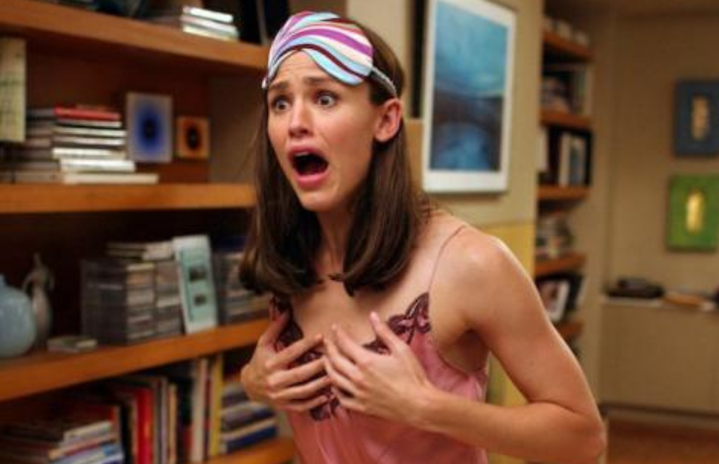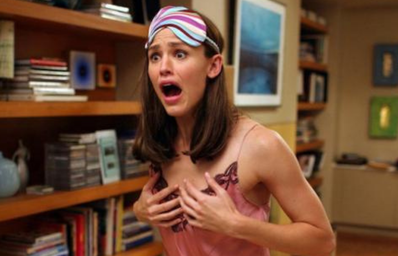As someone who has an insatiable love for romantic comedies, I’ll always swoon over sappy fairytale fantasy stories. Released in my birth year, 13 Going on 30 (starring Jennifer Garner) is one of my favorite movies of this genre. I appreciate its sweet lessons on navigating relationships and growing up, how cozy and nostalgic it makes me feel, and Jenna Rink’s universally adored multicolor dress. But what sticks out to me the most is her wish to be 30.
At 13, most of us had idealistic expectations about getting older. Unknowing of rent and taxes, we believed adulthood would be glamorous, boundless, and homework-less. Jenna wants the power and autonomy that grown-ups get to enjoy – I know from experience that middle school sucks! I’m more intrigued by the filmmakers’ decision to make the adult Jenna 30 instead of 25, or even 21.
Although it’s not a groundbreaking choice, I find it unusual yet necessary in a society where women past their 20s are wrongly perceived as old hags by younger generations and considered undesirable by men. Gendered ageism is not a new concept, but the advancement of cosmetic surgery and anti-aging skincare products, paired with biased media representation and underrepresentation of older adults in film and television, has normalized it in new ways. Celebrities who spend thousands on wrinkle-reducing procedures, beauty brands that reinforce ageist stereotypes in their advertisements, and Hollywood casting directors who reject middle-aged actresses solely because they’re, well, middle-aged are all powerful upholders of our misogyny-driven culture. We treat youth like currency; when a woman inevitably runs out, her value declines. Girls who once felt enthusiastic about experiencing adulthood become fearful of aging due to this social conditioning. Our collective obsession with youth has warped our perception of age and made it easy to forget that growing older is a privilege. Hence, aging as a woman means sacrificing parts of yourself in pursuit of respect.
Enter Jenna Rink, an esteemed journalist who’s 30, flirty, and thriving. Her pastel wardrobe is glamorous, her creativity is boundless, and her homework involves writing and editing for a fashion magazine. She lives a dreamlike life, challenging the sexist misconception that women “expire” at 30; Jenna’s physical age doesn’t interfere with her social status, her taste for fun floral fashion, or her appeal to romantic interests. Nor does she hesitate to voice her beliefs, dress how she wants, and awkwardly dance to Michael Jackson’s “Thriller” – all in the body of a 30-year-old woman. Most of us end up conforming to age norms that restrict how we exist, but Jenna’s childlike wonder persists despite the cynicism of the people around her. That same carefree teenage girl resides within all of us, and sometimes we need a character like Jenna to remind us that self-expression has no age limit.
This positive attitude towards being 30 remains rare in modern media. However, I won’t argue that we should engage with 13 Going on 30 as a feminist text; there are flaws, such as the joke about Jenna getting a nose job and the stereotypical portrayal of her best friend, Lucy, as a catty woman. As another writer points out, whether Jenna still ends up a magazine journalist after making the “right” choices is unclear. She does move into a residential house with her childhood friend and lover, Matty, which raises the question: Is the movie imposing the classic American family stereotype in which a woman gives up her career to build a future with her husband in the suburbs? Jenna’s whiteness also grants her access to privileges that may be unavailable to a 30-year-old woman of color, not to mention her conventional attractiveness and middle-class background.
Growing older and experiencing life by decades is as beautiful as the smile lines that plastic surgeons try to convince you are unattractive or the colorful clothes that some will say you’re too old to wear. While imperfect, the movie does provide an optimistic perspective on aging. It sends the message that love and success are not exclusive to 20-somethings and encourages girls to look forward to the rest of their lives, regardless of what everyone else thinks. My undying love for chick flicks is part of what makes me me, and I will continue to proclaim it when I’m 90 because living authentically, as Jenna Rink does, matters most.


